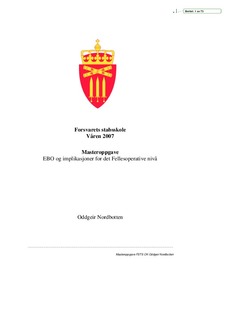| dc.description.abstract | This thesis is written as a part of the Master Programme at the Norwegian Defence Staff College. The main problem explored in this thesis is how the EBO concept and the emerging EBAO concept influence the role of the JFC and his staff, recognizing the fact that JFCs and staffs actually do not carry out military operations. Rather the role of a JFC is instrumental, which is to facilitate effective military operations.
The EBO-concept, which was derived from the conduct of the air campaign during the war to liberate Kuwait in the 1990-91 Middle East crisis, is looked into and analysed to discern how the beneficiary actor, the conventional aircraft, was supported by the central air headquarter.
The EBAO concept, which builds on the EBO-concept, looks at the need for continuous adaptation of planning, execution and assessment to create desired effects that supports the strategic end-state. These effects are then continuously judged whether or not they create the circumstances necessary to terminate conflicts on favourable terms. The main issues emphasized in the EBAO approach is the need to establish a knowledge framework of current operations, emphasizing feed-back, both successes and failures, and the adaptation of the execution of military operations by those actually executing the operations – the forces. In respect to current practice of planning and execution the creativity is established on both the execution and leadership end, rather than focusing creativity solely in the hands of the JFC.
The main implication of the EBO and the emerging EBAO approach on the JFC, is to focus more on the continuous knowledge development of the opponent and the operational environment, while maintaining a need to provide better decision support to accomplish mission. This requires the operational level of war to enhance its ability to establish the unity of purpose, rather than exercise its unity of command role.
Key | en_US |
